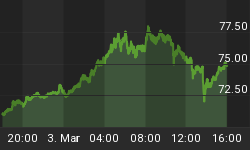"...The true cost of beating inflation vs. the cost of letting it run..."
"AT THE SURFACE LEVEL", explains Bradford De Long in a decade-old paper, the destruction of money during the 1970s happened because no one in power "placed a high enough priority on stopping inflation."
The three '70s presidents - Nixon, Ford and then Carter - all inherited "painful dilemmas with no attractive choices". The forlorn hope of trying to grow jobs at the expense of sound money had long since locked in that problem the previous decade.
What's more, "no one had a mandate to do what was necessary," our Berkeley professor goes on. "It took the entire decade for the Federal Reserve as an institution to gain the power and freedom of action necessary to control inflation."
But at the very deepest level, "the truest cause of the 1970s inflation was the shadow cast by the Great Depression of the 1930s," De Long concludes.
"It took the 1970s to persuade economists, and policy makers...that the political costs of even high single-digit inflation were very high."
How high were the political costs of seven, eight and nine per cent annual inflation? Amid fuel shortages and the energy-price crisis of 1979-80, the inflationary bubble ended with Jimmy Carter's complete rout at the polls, plus all-out strikes over wage claims right across Europe.
Here in Britain, the socialist Labour government collapsed thanks not to the state's near-bankruptcy and IMF bail out of 1976, but during the "Winter of Discontent" of 1979 when grave-diggers and rubbish collectors went on strike for more pay.
It took four elections and 17 years before UK voters let Labour take power again. The trades unions' role in apparently stoking inflation - by demanding near-inflationary pay rises - gave the Thatcher administration a mandate to destroy them almost entirely.
And investors? "Stock prices declined in real terms by three quarters between 1966 and 1982," notes Martin Hutchinson at PrudentBear. US Treasury bonds became known as "certificates of confiscation" as their annual returns - paid in fast-depreciating currency - fell far below the rate of inflation. Real estate values just about kept level with prices. Cash savers and fixed-income retirees were pretty much eaten alive.
Put another way, the developed world of the early 1970s preferred to let inflation run wild because few people guessed what a mess it would cause - neither for workers, business or capital investors.
A little inflation never hurt anyone, after all. Least of all politicians looking for re-election during a boom in the credit cycle! And so the great and the good balked at their chance to act early. Because they didn't dare "liquidate labor, liquidate stocks, liquidate the farmers, liquidate real estate," as US Treasury secretary Andrew Mellon famously cried in the '30s.
Let's face it; destroying wage-earners, equity markets and real estate will never be much of a vote-winner. Not least with a peanut-farmer sat in the White House.
So instead, interest rates remained beneath growth in inflation, trying to juice the economy and side-step a slowdown. Price controls were imposed, ripping off manufacturers and also rigging the inflation figures applied to new wage claims. And cash savers - meaning anyone who didn't spend all they got on the first of the month - got awfully twitchy about the value of money.
The root cause of inflation - too much credit and cash chasing itself - was only addressed when consumers and business were hurt so badly, fixing the problem finally grew urgent.
Even the Federal Reserve and US Treasury caught on in the end, noting how the rush to Buy Gold was merely "a symptom of growing concern about world-wide inflation." People just wanted to get some kind of foothold as the value of money collapsed in a landslide. Whether investors, laborers or land-owners, no one could ignore what was happening to prices - and what was happening to prices started and ended with money.
As Jürgen Stark - a member of the European Central Bank (ECB) - noted of Germany's early 20th century hyperinflations in a speech last week, "a strong coalition supported an open inflation aimed at real debt relief...But the long lasting costs of such a policy [were] the destruction of people's trust and confidence in their currency."
Whereas today? "I know that many believe it is somehow sinful or immoral for the Fed to hold [interest] rates so low as to render the real return on cash to be negative," writes Paul McCulley in his latest Central Bank Focus for Pimco, the world's biggest bond fund. "[But] I don't buy this proposition."
Pointing to the chasm between unionized labor's power in the 1970s and today's sub-inflationary pay claims, McCulley asks why cash savers - those folk providing investment capital through their bank deposits - shouldn't suffer as well.
"Why should it be that those who only have labor to offer to the market should not be made whole [amid rising inflation] while those with cash should be made whole? If indexing to headline inflation is inappropriate for labor wages and capital's profits, why should cash yields be indexed by the Fed?"
Why indeed? Sacrifice enough cash savers along with non-unionized labor, in fact, and maybe this sweet little inflation can just keep running for ever. No pain, no costs! Other than the destruction of trust and confidence in currency. Which might just prove expensive long-term.
The value of money directly relates to its price. Sub-zero returns, Paul McCulley forgets, will only force investors to Buy Gold as businesses fold and wage-earners lose out.
Those who buy early might at least get ahead.
















